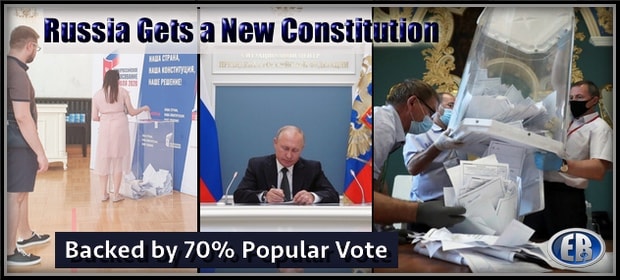
ER Editor: Russia has recently undergone seven days of voting on over 200 proposed changes to its constitution, which finished yesterday, July 1. Of general note about the Russian constitution:
Previous Russian constitutions were either inspired or influenced by foreign legislators, but the amendments that the country is voting on are truly “Russia-centered,” political analyst Martin McCauley told RT.
It’s no wonder then that the Western media ignores more than 200 proposed changes to the Russian Constitution and only focuses on the one that may allow Vladimir Putin run for president again, if he wishes to do so.
“‘Putin wants to be Tsar for life’ – that makes headlines, everyone understands that and if you go into the details of constitutional law people get bored,” McCauley pointed out.
But the week-long vote on constitutional amendments, which concludes on Wednesday, is actually bigger than the figure of the country’s president, McCauley said. The Constitution of the Tsarist Russia in 1906 was based on French principal law, while the 1993 Constitution, adopted under then-President Boris Yeltsin, mainly drew from American ideas.
With this constitution, it’s the first one in Russian history, which concentrates thinking about Russia; it’s Russia-centered and therefore it’s truly a Russian constitution,” the analyst said.
We recommend watching this accompanying RT video below because Martin Macauley briefly explains how important it is that the new constitution puts Russian law ahead of international law, and what other protections the constitution puts in place against foreign takeover, of which Russia has had so much over the last century:
The 206 amendments range from social issues like pensions to rules for government officials. The one that has received most media attention redefines eligibility for the presidency. In theory, it would allow President Vladimir Putin to run for office two more times, potentially staying in power until 2036.
…
Other changes include the regular indexation of pensions for inflation and a guaranteed minimum wage above subsistence level; the definition of marriage as a union between one man and one woman; a ban on top government officials from holding foreign passports; and restricting future presidents to serving only two terms. There was some controversy about the new constitution also including a mention of God, in regards to the country’s heritage.
The newly-amended constitution also marks a slight shift away from the hyper-presidential system, introduced by former President Boris Yeltsin in 1993. By redistributing some powers to other government organs, both Russia’s lower and upper houses of parliament now have the opportunity to propose and approve of certain officials.
Further, Russia has come a long way since 1993; Putin’s constitutional changes reflect the needs of a revitalized state. Of note:
Russia’s ‘super-presidential’ 1993 Constitution was forged in blood after violent upheaval, at a time when the country was on its knees. It is logical that it would be revisited when modern Russia had finally come of age.
What is so problematic with the current 1993 Constitution, and what are the reasons behind the proposed amendments? The answers can be found in the circumstances under which President Boris Yeltsin’s document came into effect and in the major transformation that Russia has undergone since then.
First of all, it is necessary to stress that Russia in 1993 and Russia in 2020 are essentially two
different countries. In 1993, it was a bleak shadow of the Soviet Union, with a grim present and uncertain future. Yeltsin, along with Minister of Foreign Affairs Andrey Kozyrev and other liberal-minded members of his team, were doggedly pushing their country into the American sphere of influence.
It, therefore, comes as no surprise that Yeltsin’s Constitution – adopted just two months after his team’s undemocratic usurpation of power (by means of shelling and storming the parliament during the October putsch) – wasn’t fit for its purpose as the supreme law of a great power. Instead, it legitimized the servicing of Western elites and Washington in particular.
The widely known consequences of such policies had been tragic for Russia, as it descended into a decade of lawlessness, poverty, and war.
********
Overwhelming support for Putin’s constitution changes a wake-up call for Westerners who claim Russian system is bound to collapse
BRYAN MacDONALD for RT
The outcome of Russia’s ‘national vote’ on a series of amendments to the constitution serves to reaffirm that most Russians want the country to plow its own furrow, regardless of what outsiders think.
In the end, the margin was huge. Exit polls suggested around 70 percent of voters said ‘yes’ to 206 amendments to their constitution, and close to 30 percent rejected the changes. Official results put the ‘yes’ vote to above 78 percent, with 99 percent of ballots counted.
Even Moscow liberal political organizers conceded that their own exit polls showed the capital had supported Vladimir Putin’s proposals. What’s more, those tallies revealed how a majority of voters in numerous Moscow districts with opposition-controlled local councils had backed the ‘yes’ side.
One thing forgotten in almost all Western speculation about the process (erroneously labeled a ‘referendum’ by some US/UK media) was that it wasn’t strictly necessary at all. The backing Putin obtained in spring from the Duma (parliament), the Constitutional Court, and all 85 federal subjects sufficed. However, the President decided to stage a ‘confirmatory plebiscite’ to obtain broad public legitimacy for his project. Thus, the vote itself was mostly about establishing whether Putin still has a popular mandate to uphold his domination of Russian politics.
It had been a curious ‘campaign,’ with most prominent opponents of the Kremlin relatively muted. Indeed, the half-inside-the-tent Communist Party was an outlier in being more vocal and forthright than usual, emphatically calling for a ‘no’ vote. Veteran leader Gennady Zyuganov dubbed it “disappointing and depressing.”
Alexei Navalny had labeled the existing Constitution “disgusting” in January, saying it contained “the mechanisms used to usurp power” and telling his supporters “do not defend it.”
That document dated back to 1993, when then-President Boris Yeltsin introduced it – with Western support – to create a “hyper-presidential” system. It came after the Communist-controlled parliament attempted to impeach the pro-Western leader, and he resorted to military force to hold onto power, which led to 187 people killed and 437 wounded.
On Wednesday evening, a protest in downtown Moscow was so poorly attended and halfhearted that police handed out masks to the demonstrators, with Covid-19 in mind. Hardly the rough arm of the state crushing resistance. A handful of dissenters who gathered on Red Square, without permission, were detained and then swiftly released.
(ER: click on square below for tweet)
In truth, the Kremlin had left the opposition with a thankless task. While they opposed the plan to nullify Putin’s term limits, a lot of popular measures included were difficult to oppose without offending large swaths of voters: for instance, civil servants being prohibited from holding foreign bank accounts and citizenship, a ban on giving away any Russian territory, and a guarantee that the minimum wage will not be lower than the cost of living.
.
Like it or not, some people were also attracted by the clause banning same-sex marriage and another one saying ethnic Russians are to be recognized as the founders of the state. Another popular change was the provision recognizing the modern Russian Federation as the successor to the USSR and preserving its legacy as the victor in WWII, fueling the sort of militarism many liberals find distasteful.
Another issue is that polls have consistently shown a majority of Russians actually want Putin to remain in power after the 2024 election. Only last summer, Levada (a Western-leaning pollster independent of the Kremlin) found that 54 percent of Russians would like him to stay on until at least 2030. Only 38 percent wanted him out four years from now.
Western media coverage of the process has been rather bizarre, focusing almost solely on the Putin term-limits issue while ignoring or glossing over the fact that the vast majority of Russians still clearly support his system. Once upon a time, this was attributed to the power of ‘state TV,’ but today, when the internet is beginning to overtake the zombie box as the primary source of news, that unsophisticated trope is clearly redundant.
Russia is not a dictatorship, and Putin is not a dictator. The setup is ‘soft’ authoritarian and it relies on the consent of the majority to keep power. The provisions in the new constitution – most notably term limits for future presidents and immunity after leaving office – also suggest the president wants to continue with a form of representative government.
The Kremlin is clearly not trying to go down the Chinese or Soviet route, but also doesn’t want to embrace western-style ‘liberal democracy.’ Much as Russia itself is both in Europe and Asia but truly ‘of’ neither, its government structure and electoral procedures are also clearly going to remain somewhat unique. After Wednesday’s vote, it’s evidently what most Russians themselves want. At least for the foreseeable future, anyway.
Nevertheless, expect the endless US/UK media headlines predicting Russia’s imminent collapse to keep coming. For over twenty years, they have been consistently wrong, and they’ll almost certainly be inaccurate for at least twenty more.
************
Original article

••••
The Liberty Beacon Project is now expanding at a near exponential rate, and for this we are grateful and excited! But we must also be practical. For 7 years we have not asked for any donations, and have built this project with our own funds as we grew. We are now experiencing ever increasing growing pains due to the large number of websites and projects we represent. So we have just installed donation buttons on our websites and ask that you consider this when you visit them. Nothing is too small. We thank you for all your support and your considerations … (TLB)
••••
Comment Policy: As a privately owned web site, we reserve the right to remove comments that contain spam, advertising, vulgarity, threats of violence, racism, or personal/abusive attacks on other users. This also applies to trolling, the use of more than one alias, or just intentional mischief. Enforcement of this policy is at the discretion of this websites administrators. Repeat offenders may be blocked or permanently banned without prior warning.
••••
Disclaimer: TLB websites contain copyrighted material the use of which has not always been specifically authorized by the copyright owner. We are making such material available to our readers under the provisions of “fair use” in an effort to advance a better understanding of political, health, economic and social issues. The material on this site is distributed without profit to those who have expressed a prior interest in receiving it for research and educational purposes. If you wish to use copyrighted material for purposes other than “fair use” you must request permission from the copyright owner.
••••
Disclaimer: The information and opinions shared are for informational purposes only including, but not limited to, text, graphics, images and other material are not intended as medical advice or instruction. Nothing mentioned is intended to be a substitute for professional medical advice, diagnosis or treatment.




